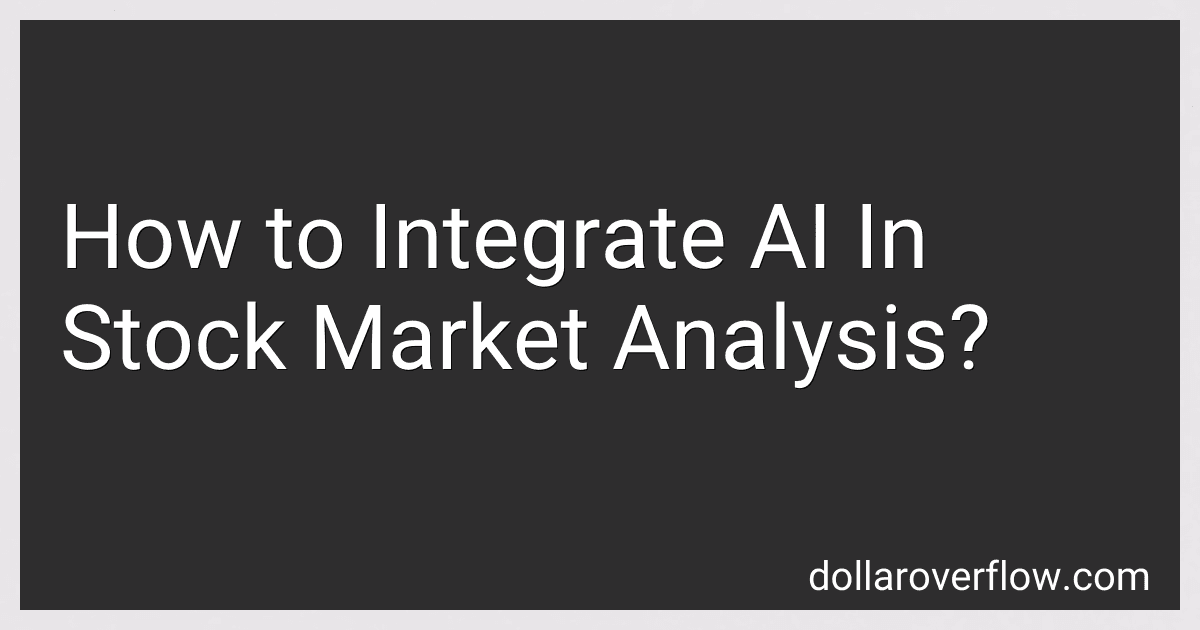Integrating AI in stock market analysis involves using advanced algorithms and machine learning techniques to analyze and predict stock market trends, patterns, and behaviors. AI can be used to analyze large amounts of data quickly and efficiently, identify patterns and trends that may not be obvious to human analysts, and make more accurate and informed investment decisions.
To integrate AI in stock market analysis, one can use various machine learning models such as neural networks, deep learning, and natural language processing. These models can be trained on historical data to predict future stock prices, identify trading signals, and automate trading strategies.
It is essential to have a robust data infrastructure in place to gather and process the massive amounts of data needed for AI analysis. This includes real-time market data, financial reports, news articles, and social media sentiment. AI algorithms can then analyze this data to generate insights and recommendations for trading.
Furthermore, it is crucial to continuously monitor and update the AI models to ensure they are adapting to changing market conditions and making accurate predictions. This involves retraining the models with new data, tweaking parameters, and integrating feedback mechanisms to improve performance over time.
Overall, integrating AI in stock market analysis can provide investors with a powerful tool to make better investment decisions, reduce risks, and maximize returns in today's fast-paced and complex market environment.
What is the impact of AI on traditional stock market analysis methods?
The impact of AI on traditional stock market analysis methods is significant in several ways:
- Improved accuracy: AI can process vast amounts of data and analyze complex patterns and trends much faster and more accurately than human analysts. This can lead to more informed investment decisions and potentially higher returns.
- Enhanced efficiency: AI algorithms can automate many aspects of stock market analysis, saving time and resources for stock market professionals. This allows analysts to focus on higher-level strategic tasks rather than mundane data processing.
- Increased complexity: AI algorithms can handle more factors and variables in stock market analysis than traditional methods, potentially leading to more nuanced and sophisticated strategies. However, this also means that the stock market landscape becomes more complex and difficult to navigate for human investors.
- Reduced reliance on human judgment: While AI can provide valuable insights and predictions, it is important to remember that it is just a tool and not a replacement for human judgment. Ultimately, human investors still need to interpret and act on the recommendations provided by AI algorithms.
Overall, the impact of AI on traditional stock market analysis methods is a mixed bag, with both opportunities and challenges for investors and market professionals. It is essential for investors to understand the capabilities and limitations of AI in stock market analysis and to use it as a complement to, rather than a replacement for, human expertise.
What is the role of data in AI-driven stock market analysis?
Data plays a crucial role in AI-driven stock market analysis as it is the foundation on which AI algorithms make predictions and decisions. The role of data in AI-driven stock market analysis includes:
- Data collection: AI-driven stock market analysis requires vast amounts of data to train machine learning models. This data includes historical stock prices, company financial reports, market news, and other relevant information.
- Data preprocessing: Before feeding data into AI algorithms, it needs to be cleaned, normalized, and formatted appropriately to ensure the accuracy and effectiveness of the analysis.
- Data analysis: AI algorithms use historical data to identify patterns, trends, and correlations that can help predict future stock prices or market movements.
- Decision making: Based on the analysis of historical data, AI algorithms can make real-time decisions on buying, selling, or holding stocks to optimize investment strategies.
- Continuous learning: AI-driven stock market analysis constantly learns from new data and adjusts its predictions and strategies accordingly, making it more adaptable and effective in fast-changing market conditions.
Overall, data is the fuel that powers AI-driven stock market analysis, helping investors make more informed decisions and potentially generate higher returns on their investments.
What are the potential risks of relying on AI for stock market analysis?
- Data bias: AI algorithms can be biased based on the data they are trained on, which can lead to misleading results or incorrect predictions.
- Overreliance on historical data: AI algorithms may rely too heavily on past performance and fail to account for unexpected or unprecedented events that can impact stock prices.
- Lack of human oversight: Relying solely on AI for stock market analysis can lead to a lack of human oversight, which can result in incorrect decisions being made.
- Vulnerability to cyber attacks: AI systems used for stock market analysis are vulnerable to cyber attacks, which can compromise the integrity of the analysis and lead to financial losses.
- Rapid changes in market conditions: AI algorithms may struggle to adapt to rapid changes in market conditions, leading to inaccurate predictions and decisions.
- Lack of transparency: AI algorithms can be complex and difficult to interpret, which can make it challenging to understand why certain predictions or decisions are made.
- Market manipulation: There is a risk that AI algorithms can be manipulated or exploited by malicious actors for their own gain, leading to market manipulation and unfair advantages.
- Regulatory risks: The use of AI for stock market analysis may raise regulatory concerns, particularly regarding compliance with financial regulations and accountability for decisions made by AI systems.
